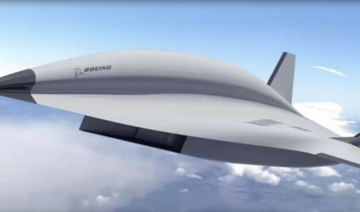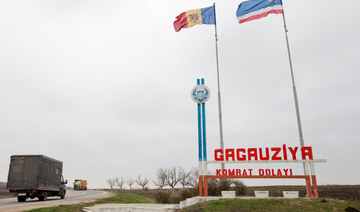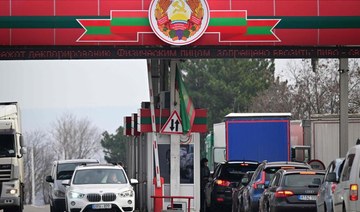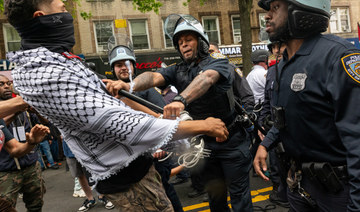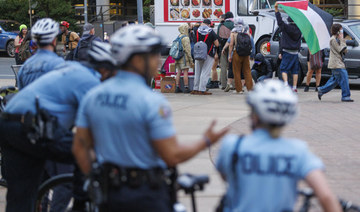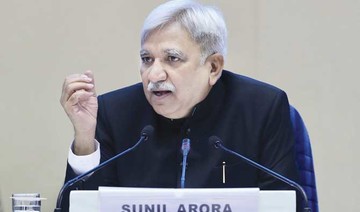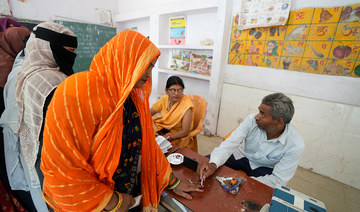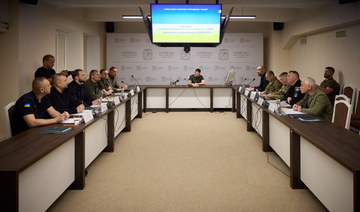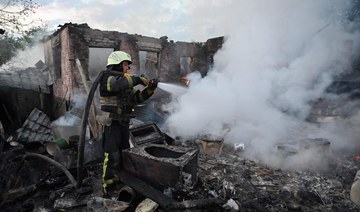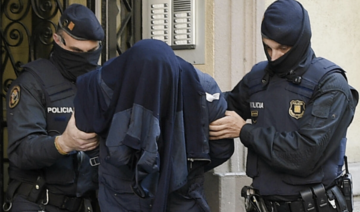WASHINGTON: They fly at speeds of a mile a second or faster and maneuver in ways that make them extra hard to detect and destroy in flight.
President Donald Trump calls them a “super-duper missile,” though they’re better known as hypersonic weapons. And they are at the heart of Trump administration worries about China and Russia.
For decades the United States has searched for ways to get ultra-fast flight right. But it has done so in fits and starts. Now, with China and Russia arguably ahead in this chase, the Trump administration is pouring billions of dollars a year into hypersonic offense and defense.
The Pentagon makes no bones about their purpose.
“Our ultimate goal is, simply, we want to dominate future battlefields,” Mark Lewis, the Pentagon’s director of defense research and engineering for modernization, told reporters in March.
Critics argue that hypersonic weapons would add little to the United States’ ability to deter war. Some think they could ignite a new, destabilizing arms race.
Two things make these weapons special: speed and maneuverability. Speed brings surprise, and maneuverability creates elusiveness. Together, those qualities could mean trouble for missile defenses.
By generally agreed definition, a hypersonic weapon is one that flies at speeds in excess of Mach 5, or five times the speed of sound. Most American missiles, such as those launched from aircraft to hit other aircraft or ground targets, travel between Mach 1 and Mach 5.
Trump occasionally mentions his interest in hypersonic weapons, sometimes without using the term. In February he told governors visiting the White House: “We have the super-fast missiles — tremendous number of the super-fast. We call them ‘super-fast,’ where they’re four, five, six, and even seven times faster than an ordinary missile. We need that because, again, Russia has some.”
And last Friday, Trump told reporters, “We have no choice, we have to do it, with the adversaries we have out there,” mentioning China and Russia. He added, “I call it the super-duper missile.” He said he “heard” it travels 17 times faster than any other US missile. “It just got the go-ahead,” he added, although the Pentagon would not comment on that.
The Pentagon is pursuing two main types of hypersonic weapons. One, called a hypersonic glide vehicle, is launched from a rocket. It then glides to a target, maneuvering at high speed to evade interception. The other is sometimes referred to as a hypersonic cruise missile. Capable of being launched from a fighter jet or bomber, it would be powered by a supersonic combustion ramjet, or scramjet, enabling the missile to fly and maneuver at lower altitudes.
On March 19, the Pentagon flight-tested a hypersonic glide vehicle at its Pacific Missile Range Facility in Kauai, Hawaii. It deemed the test a success and “a major milestone toward the department’s goal of fielding hypersonic warfighting capabilities in the early- to mid-2020s.”
Unlike Russia, the United States says it is not developing hypersonic weapons for use with a nuclear warhead. As a result, a US hypersonic weapon will need to be more accurate, posing additional technical challenges.
As recently as 2017, the Pentagon was spending about $800 million on hypersonic weapon programs. That nearly doubled the following year, then rose to $2.4 billion a year later and hit $3.4 billion this year. The administration’s 2021 budget request, which has yet to be approved by Congress, requests $3.6 billion.
Although this is a priority for Pentagon spending, it could become limited by the budgetary pressures that are expected as a result of multitrillion-dollar federal spending to counter the coronavirus pandemic.
Top Pentagon officials say it’s about Russia, and even more so, China.
“By almost any metric that I can construct, China is certainly moving out ahead of us,” Lewis, the Pentagon research and engineering official, said Tuesday. “In large measure, that’s because we did their homework for them.” Basic research in this field was published by the US years ago, “and then we kind of took our foot off the gas,” although the Pentagon is now on a path to catch up and surpass China, he added.
China is pushing for hypersonic weapon breakthroughs. It has conducted a number of successful tests of the DF-17, a medium-range ballistic missile designed to launch hypersonic glide vehicles. According to a Congressional Research Service report in March, US intelligence analysts assess that the DF-17 missile has a range of approximately 1,000 to 1,500 miles and could be deployed this year.
Russia last December said its first hypersonic missile unit had become operational. It is the Avangard hypersonic glide vehicle, which Moscow says can fly at Mach 27, or 27 times faster than the speed of sound, and could make sharp maneuvers to bypass missile defenses. It has been fitted to existing Soviet-built intercontinental ballistic missiles, and in the future could be fitted to the more powerful Sarmat ICBM, which is still in development.
Quest for ‘super-duper missile’ pits US against key rivals
https://arab.news/ys7rf
Quest for ‘super-duper missile’ pits US against key rivals

- For decades the United States has searched for ways to get ultra-fast flight right
- Russia last December said its first hypersonic missile unit had become operational
Moldova turns to Russia to seek extradition of convicted politician
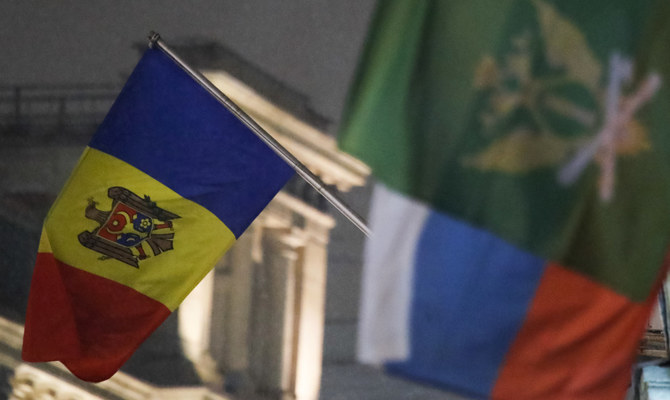
- The Victory bloc, made up of four parties, campaigns with the slogan “No to the EU” and calls for Moldova instead to join the Eurasian Economic Union — a Russian-led regional grouping
CHISINAU: Moldova is now seeking extradition from Russia of an opposition politician convicted of mass fraud after he moved there from exile in Israel, the country’s justice minister said on Saturday.
Ilan Shor, a pro-Russian business magnate, was sentenced last year in absentia to 15 years in prison in connection with the disappearance from the banking system of $1 billion in 2014, dubbed Moldova’s “theft of the century.”
Shor has organized noisy street demonstrations against pro-European President Maia Sandu and urged Moldovans to vote “no” in a referendum authorities have called for October on joining the European Union by 2030.
Justice Minister Veronica-Mihailov Moraru said Moldova would redirect its extradition appeals to Moscow after Shor said he had moved to Russia and announced he had been granted Russian citizenship.
“The justice ministry has not been informed of this by the Russian authorities,” she told TVR Moldova television.
“If we are advised officially that he holds Russian citizenship, we will analyze the circumstances and consider how to act in procedural terms.”
Moldova, an ex-Soviet state lying between Ukraine and Romania, had repeatedly sought Shor’s extradition from Israel.
After his conviction, a party bearing Shor’s name was banned by the Constitutional Court and a new party, called “Chance,” was formed in its place.
Shor is the driving force behind the “Victory” electoral bloc launched last month — in Moscow — to oppose the EU referendum and Sandu’s bid for re-election at a poll to be held on the same date.
He said last week he wanted to become prime minister if a president favorable to his views would nominate him.
Sandu denounces Moscow’s invasion of Ukraine and describes Russia and corruption as the biggest threats to her country.
The Victory bloc, made up of four parties, campaigns with the slogan “No to the EU” and calls for Moldova instead to join the Eurasian Economic Union — a Russian-led regional grouping.
It has not yet decided on a candidate to run against Sandu. The opposition Socialists and Communists, also friendly to Moscow, oppose the pro-EU referendum but have shown little inclination to cooperate with Shor and the Victory bloc.
Polish students occupy top universities to cut ties with Israeli academia
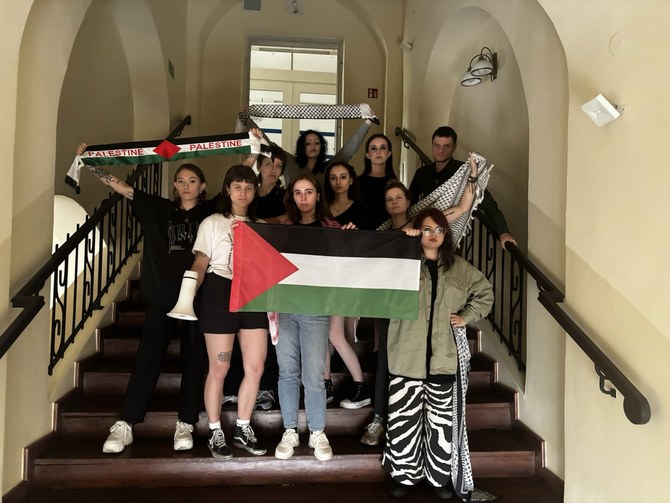
- Students set up encampments at the University of Warsaw and Jagiellonian University
- ‘We consider opposing genocide as our highest obligation,’ students say
WARSAW: Polish students have joined the global movement to end partnerships with Israeli institutions and were occupying the country’s top campuses on Saturday because of Israel’s war on Gaza.
Students and alumni of 12 universities in Poland have been calling on their management to publicly disclose which Israeli academia, research centers, organizations and companies they have been cooperating with and in what scope.
In open letters to rectors, they demanded that the universities “boycott Israeli institutions at the national and international level until the occupation of Palestine ends, recognize the right of Palestinians to equality and self-determination, and recognize the right of return for Palestinian refugees.”
As no action followed from university authorities, on Friday evening they set up encampments at the campuses of the University of Warsaw — the country’s largest academic institution — and of the Jagiellonian University — the oldest and most prestigious.
In a joint manifesto, the protesters said: “We will occupy the university space with our own bodies to demand action ... we consider opposing genocide as our highest obligation.”
Israeli airstrikes and ground offensives in Gaza have since October killed 36,000 Palestinians with more than 80,000 wounded, the vast majority children and women. Many have lost their lives as most of the hospitals have been flattened by bombardment and no medical assistance could reach them.
Protesting students say that failing to oppose the onslaught would mean tacit consent — and complicity.
The University of Warsaw is linked through a research project to the Ben-Gurion University, whose Homeland Security Institute partners with the biggest Israeli arms manufacturers such as Elbit Systems, Rafael Advanced Defense Systems and the Israeli Ministry of Defense. It is also linked to the University of Haifa, which runs special programs for Israeli forces and intelligence.
“As a student, I feel I should have a say in what our university is investing and what its partners are. We know that the university is tied to the Israeli army, forces and apartheid system,” Agnieszka, a sociology student and one of the coordinators of the strike at the University of Warsaw, told Arab News.
“That’s why I’m here ... I hope it will change something.”
Agnieszka was speaking from behind the university gate, which has been locked since Friday evening as campus authorities sealed all entry points, preventing anyone from leaving or getting inside.
People were coming to the gate and the campus fence to bring the students water, food and power banks, and to show support.
While no one could join their encampment anymore, the dozens of students gathered inside believed they could bring change.
“We’ve been protesting since October against the genocide that is occurring in Gaza, and now we’re sort of bringing it closer,” said Nena, who studies at the Faculty of Philosophy.
“We have more direct impact on the institutions we are part of.”
At the same time, 300 km away, students of the Jagiellonian University in Krakow were also locked up at their campus, posing the same demands as those in Warsaw, and vowing that they “will not be indifferent, will not be silent, will not be passive,” as they called for others to join.
“It’s important for me to be here,” Gabriela, an international relations student told Arab News from the Krakow protest site. “It’s important to show solidarity with other encampments around the world, so that authorities can’t ignore our demands any longer.”
The University of Warsaw and the Jagiellonian University have not engaged in any discussions with the protesters. Neither university commented on whether it would agree to the students’ demands. The spokesperson of the Jagiellonian University said that to “ensure the safety of the strike participants,” there was a person “appointed to monitor the situation.”
Millions of Indians beat extreme heat to cast votes
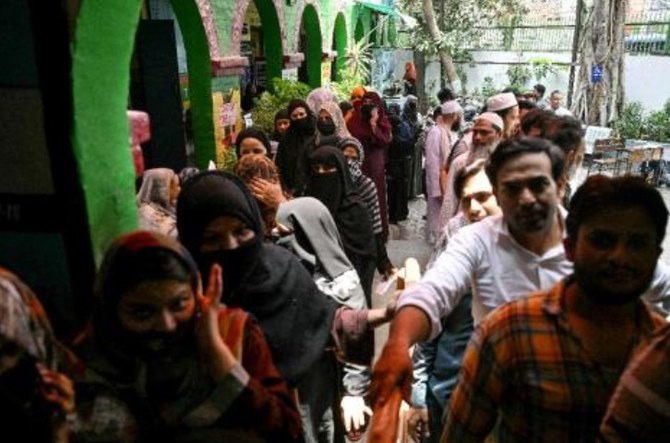
- 111 million people vote in election’s penultimate phase
- Temperature in New Delhi soared to more than 44 degrees Celsius
NEW DELHI: Voters in Delhi braved a sweltering heatwave on Saturday as they queued at polling stations in the penultimate phase of India’s general election.
The voting, which more than 968 million people have been eligible to do, started on April 19. Some of India’s 28 states and eight federally governed territories completed the process in a single day, while others have spread it out.
The sixth phase of the poll covered the capital, Delhi, as well as the neighboring states of Haryana and Uttar Pradesh, Jharkhand, Odisha, West Bengal and Bihar in the country’s east, and Jammu and Kashmir.
In Delhi, voters queued to cast their ballots despite the temperature soaring to over 44 degrees Celsius — with humidity making it feel like 56 C, according to reports — prompting the Election Commission to deploy paramedics to some polling stations.
While there have been concerns over voter turnout — with the first phase estimated to have seen at least 4 percent fewer people take part than in 2019’s election — those who arrived to cast their votes said there was no way the heat could deter them.
“Voting is the only way we can convey our feelings toward governance. It is a decisive way. To spend one hour in the line after five years is not a big deal for us,” said Karan Sharma, who was voting in the East Delhi constituency.
“We were complaining about the heat, but ... it’s a duty, it’s like eating food. After every five years, the festival comes, we have to participate in it.”
For Kavita Wadhwa, who cast her vote in the New Delhi constituency, it was a matter of exercising her rights.
“We have the right to select our own leaders,” she told Arab News. “It’s important for us ... It’s a democratic country.”
The election sees Prime Minister Narendra Modi chasing a third straight five-year term in power, targeting 400 of the 543 parliamentary seats for the National Democratic Alliance led by his Hindu nationalist Bharatiya Janata Party, which has been in power since 2014.
He is challenged by an alliance of two dozen opposition parties — the Indian National Developmental Inclusive Alliance (INDIA), led by the Congress Party, which ruled the country for close to 45 years following its independence in 1947.
Modi’s key contender is Congress leader Rahul Gandhi, the son of Rajiv Gandhi, a grandson of Indira Gandhi, and a great-grandson of Jawaharlal Nehru — all of whom were prime ministers of India.
Gandhi also cast his vote in Delhi on Saturday, after which he took to social media to encourage others to follow suit.
“Your vote will not only improve your life but will also protect democracy and the Constitution,” he said on X. “Come out of your homes in large numbers and vote for your rights and the future of your family.”
Around 111 million people were eligible to vote in the sixth phase of the election. Some of them, like Arohi Anand, were voting for the first time.
“I think it’s a great right ... The government is for us — if we don’t vote, it is on us,” he told Arab News. “(The heat) is a secondary thing. The most important thing is our vote, because the government is the most important thing; it will shape our future.”
The party or coalition that wins at least 272 of the 543 contested seats in the lower house of parliament will form the government.
The first five phases of the election have already decided the fate of 429 representatives. Saturday’s vote will add another 58.
The seventh and final phase of the election will be held on June 1. Vote counting will take place on June 4.
Russian strike on Kharkiv hardware store kills two: official
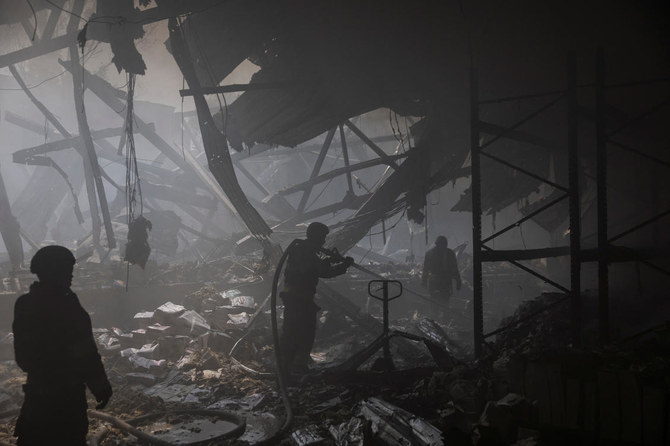
- Kharkiv regional governor Oleg Synegubov said that “two Russian guided bombs hit a construction hypermarket“
- Videos posted by witnesses on social media showed a huge column of black smoke billowing into the sky from the Epitsentr store
KYIV: A Russian strike on Saturday hit a store selling building materials in the eastern Ukrainian city of Kharkiv, killing at least two people, its mayor said.
“We know for sure about two dead,” Kharkiv mayor Igor Terekhov wrote on Telegram, saying that according to preliminary information the strike hit a hypermarket for construction materials in a residential area.
Kharkiv regional governor Oleg Synegubov said that “two Russian guided bombs hit a construction hypermarket” and “a fire broke out over 15,000 square meters.”
Videos posted by witnesses on social media showed a huge column of black smoke billowing into the sky from the Epitsentr store, located in an area of large stores beside a car park. The chain of hypermarkets sells household and DIY goods.
“We have a large number of people missing. There are many wounded,” Terekhov wrote on Telegram.
“Apparently, the attack was on a shopping center where there were many people — this is pure terrorism.”
The city of Kharkiv, Ukraine’s second largest, regularly comes under attack from Russian missiles.
Strikes on the city killed at least seven people on Thursday, local authorities said.
Russia launched a ground offensive in the northeastern Kharkiv region on May 10, but Ukraine said Friday that it had managed to halt its progress.
British man charged after allegedly joining Syrian terror group
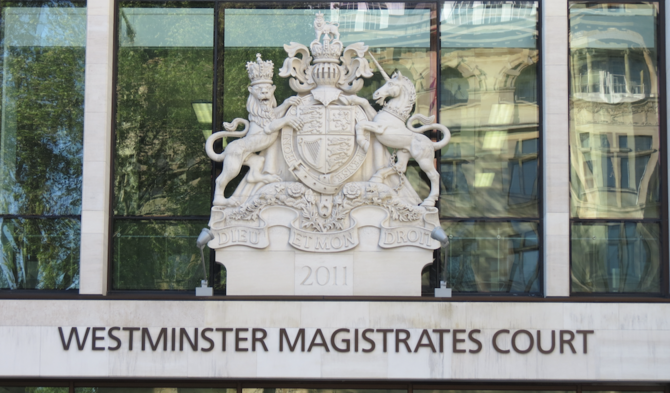
LONDON: A British man who allegedly travelled to Syria to fight for the Jaish Al-Fatah group has been charged with terrorism offences, the Metropolitan Police said on Saturday.
Isa Giga was arrested after arriving in London aboard a flight from Turkey on Thursday.
He was due to appear at Westminster Magistrates’ Court on Saturday. He is suspected of traveling to commit acts of terrorism.
“We have been clear for some time now that should anyone return to the UK whom we suspect of being involved in any terrorist-related activity overseas, then they can expect to be thoroughly investigated,” Commander Dominic Murphy, head of the force’s Counter Terrorism Command told the BBC.
“We work very closely with other partners and agencies here in the UK and overseas in order to do this and help keep the public safe.”





